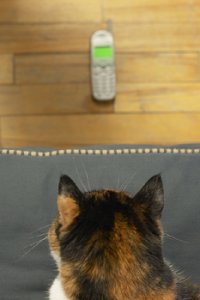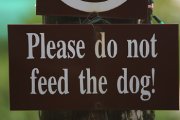|
|

|

The Top Household Dangers to Your Pets
by Dr. Kitti Wielandt, DVM
The bond between dogs and cats -- and other pets, too
-- and their owners (or their "human companions"
if you prefer) can be remarkably strong. So strong, in
fact, that there are proven direct correlations between
a pet's safety, health and happiness and their owner's
peace of mind, health and happiness.
Therefore, we are proud to announce that respected veterinarian
Dr. Kitti Wielandt will be a contributing editor to SixWise.com.
Her monthly columns will, of course, focus on the most
important steps to keep your pets safe and improve their
health, longevity and well-being. Her biography follows
her first piece below. |
Pets, like children, can sometimes put their health in danger
from seemingly harmless household items or seemingly innocuous
events. Some of these risks are obvious, such as drain opener
and other toxic chemicals, while you may find others below
more surprising.
|

Always have the phone numbers of your Vet and closest
Pet Emergency Clinic handy for emergencies.
|
Here are the most common dangers I have seen in my practice,
including tips for prevention and the key steps to take if
treatment is required.
The Danger: BITING ELECTRIC CORDS
Symptoms:
-
Most likely cardiogenic (heart) shock
-
Acute difficultly breathing
-
Often a blanched, burned area across the lips or tongue
Treatment:
-
Rush the animal to your veterinarian or a Veterinary
Emergency Clinic immediately, as this is a serious emergency.
If possible (via another member of the family or on cell
phone), give the Vet or Emergency Clinic an advance notice
of what happened and that you are on the way, so they
can immediately act upon your arrival.
Prevention:
The Danger: INGESTING HOUSEHOLD
CHEMICALS
Most Common Toxic Household Chemicals Include:
-
Rat and Mouse Poisons
-
These can taste good so animals will be inclined
to eat them
-
SYMPTOMS include lethargy, easy bruising (dark spots
on the skin), bleeding from nose or mouth (due to
internal bleeding), blood in urine or feces
-
TREATMENT: Induce vomiting. Note how much (if any)
of the product is vomited up. These products have
long-term effects on the body's ability to clot. Treatment
with Vitamin K (prescription item) is usually necessary.
-
PREVENTION: Use pet (and people) safe mouse and
rat traps such as the Victor
Electronic Mouse Trap and Victor Electronic Rat Trap.
The Victor Electronic Traps irresistibly lure mice
and rats in, and then quickly (humanely) eliminates
them with a quick electric shock. Its unique tunnel
makes it very safe around children and pets, unlike
traps that snap shut or poisons. Plus it avoids the
unpleasant site and messy clean-ups of other traps.
-
Common Antifreeze, which contains ethylene glycol
-
Has a sweet taste that attracts animals but can
be fatal if consumed in even small quantities (a single
teaspoon can kill a seven-pound cat, a tablespoon
can kill an average sized dog.)
-
SYMPTOMS: Excessive thirst, diarrhea, panting, vomiting,
convulsions, wobbling and increased urination.
-
TREATMENT: If you suspect antifreeze poisoning,
RUSH your pet to the Vet or Veterinary Emergency Clinic
-
PREVENTION: Do not use the common antifreeze that
contains ethylene glycol. Use antifreeze that contains
propylene glycol, which is safe for animals if ingested
in small amounts. Do not leave any antifreeze in the
vicinity of pets, and quickly and thoroughly clean
up spills.
-
Phenol and Phenol Derivatives, such as Pine-Sol and
Lysol
-
Phenol and derivatives such as creosote, naphthol,
wood tar and others
-
Especially toxic to cats
-
SYMPTOMS: Muscle twitches, depression, coma, respiratory
distress, jaundice. Contact Vet immediately.
-
PREVENTION: Use safe home cleaning and other products
instead of those with phenol (which is obtained from
coal tar) and phenol derivatives. Read The
Health Dangers of Phenols Found in Common Household
Cleaners for more information on this important
topic.
-
Insecticides (organophosphates, carbamates, synthetic
pyrethrins)
-
Lawn & Garden Chemicals, like fertilizers, plant
food, pesticides
-
De-Icing Salts
General Toxic Chemical Treatment and Prevention:
-
Remove the poison.
-
Identify the poison.
-
Call Vet or Emergency Vet and ask if inducing vomiting
is indicated.
-
Use Hydrogen Peroxide to induce vomiting: 1 tablespoon
per 5 pounds. If you aren't sure you can do this with
out getting bitten, TAKE THE ANIMAL TO THE VET.
Topical Poisons:
-
In addition to dangers of ingesting toxins, anything
not intended for topical use that gets on your pet's coat
can pose a risk. This includes gasoline, tar, motor oil,
ice melting chemicals, lawn chemicals, and others.
-
TREATMENT: Prevent your pet from licking at the chemical
and bathe the animal with a degreasing detergent like
Dawn dish soap.
The Danger: HEAT STROKE
Symptoms:
-
Panting, rapid heart rate, diarrhea, vomiting, seizures,
collapse
Treatment:
Prevention:
|

Please do not feed the dog or cat chocolate, coffee,
onions, raisins, grapes and the other foods listed at
the left!
|
Dangerous FOODS to Your Pets
-
Chocolate: Even small amounts of chocolate can be dangerous.
Dark chocolate is more toxic than milk chocolate. Theobromine
is the active ingredient. Clinical signs: excitability,
restlessness, tremors, seizures, increased urine output.
Diagnosis based on history of ingestion. Treatment --
if recent ingestion, induce vomiting. If symptoms already
evident, call your vet.
-
Coffee: Caffeine poisoning. Similar to chocolate ingestion.
-
Onions: Can cause anemia. Symptoms: pale gums, weakness,
lethargy.
-
Raisins / Grapes: Can cause kidney failure. Symptoms:
decreased or increased urination, vomiting, abdominal
pain, lethargy, weakness.
-
Cooked Chicken Bones and other sharp food products from
leftovers can choke dogs and cats, or cause punctures
of the stomach or intestines, so discard properly
-
Alcohol: Symptoms: staggering, inability to stand, vomiting,
diarrhea, seizures.
-
Anything from the Garbage that might be spoiled can cause
food poisoning. Symptoms: vomiting, diarrhea, loss of
appetite, weakness, lethargy.
-
Large Quantities of High-Fat Food like bacon, pork fat,
and suet can cause Pancreatitis.
-
SYMPTOMS including vomiting, tense and painful abdomen,
loss of appetite, and lethargy.
-
TREATMENT: Potentially fatal -- requires IV fluids
and hospitalization.
Dangerous DRUGS to Your Pets
Human OTC and prescription drugs including aspirin, acetaminophen,
amphetamines (Ritalin and other ADHD drugs), tranquilizers,
antidepressant drugs, hypertension drugs, heart medications
(including Statins used to lower cholesterol), and recreational
drugs.
Keep all medications and drugs intended for human use sealed
and out of pet's reach. Try to identify the drug and contact
vet immediately if suspected ingestion by your pet.
Other Pet Dangers to Watch For:
-
Many Household Plants (see The
Ten Most Common Poisons Among Kids for a list of some
of the common ones). Keep ALL household plants out of
pet's reach.
-
Rubber Bands, String, Coins and other small and
hard items can choke pets,or cause obstructions in the
intestines, so keep floors and other surfaces pets roam
on free of such items
-
Carbon Monoxide: See "The
Six Silent Killers in Your Home" for more information.
All homes should have a top-quality carbon monoxide detector/alarm
such as the Kidde Knighthawk Carbon Monoxide Alarm Kopp-3.
-
Insects: The usual troublemakers are spiders and
stinging insects (bees, wasps, hornets, etc.)
-
SYMPTOMS: intense itching (rubbing or chewing at
area), swelling, possible breathing difficulties.
-
TREATMENT: Try to identify the insect if possible
and call your vet for the appropriate treatment.
Further Reading:
The
Health Dangers of Phenols Found in Common Household Cleaners
Winter
Dangers to Your Pet: Don't Let Fido and Fifi Freeze!
The
Six Silent Killers in Your Home: How to Detect and Eliminate
Them
About Dr. Kitti Wielandt, DVM:
Veterinarian and SixWise.com columnist Dr. Kitti Wielandt
has been in small animal practice since graduating in 1987
from the University of Illinois College of Veterinary Medicine.
She practiced in Illinois from 1987 to 1996 and in Virginia
from 1996 to the present. Her focus is on small animal medicine
and surgery, Veterinary Chiropractic, Veterinary Acupuncture
and Massage therapy on people and animals. She has a special
interest in behavior and training, and in nutrition.
Dr, Wielandt is owned by Ceri, her 15 year old Tonkinese
cat, and by Pen, her 7 year old American Pit Bull Terrier,
who shows in conformation, weight pull, obedience and Rallye
obedience.
Dr. Wielandt lives in the woods near a small town in the
Shenandoah Valley of Virginia.
To get more information about this and other highly important topics, sign up for your free subscription to our weekly SixWise.com "Be Safe, Live Long & Prosper" e-newsletter.
With every issue of the free SixWise.com newsletter, you’ll get access to the insights, products, services, and more that can truly improve your well-being, peace of mind, and therefore your life!
|
|
|
|